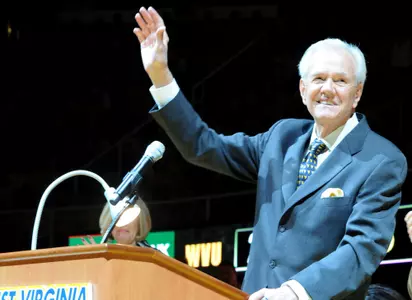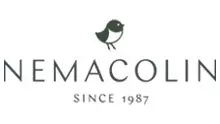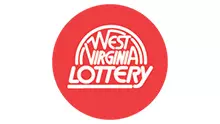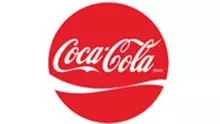
Photo by: All Pro Photography/Dale Sparks
New Hundley Documentary a Slam Dunk
April 03, 2018 10:01 AM | Men's Basketball
MORGANTOWN, W.Vs. - The new Hot Rod Hundley documentary produced by Pikewood Creative is a slam dunk, a buzzer-beater or whatever other basketball adjective you want to use to describe it.
It chronicles Hundley's colorful life in true ESPN 30-for-30 fashion.
Invitation-only premieres of "Hot Rod" were held last Wednesday night at the Clay Center in Charleston and last Friday night at The Metropolitan Theatre in Morgantown.
Written and edited by Dan Lohmann and produced by Tony Caridi, the documentary has a running time of an hour and a half and takes a deep look into Hundley's tragic childhood growing up as an orphan in Charleston, West Virginia in the late 1940s, his rise to national prominence as a prep and college basketball player in the 1950s, his disappointing six-year NBA career with the Lakers and the success he enjoyed later as a broadcaster.
It also touches on other aspects of his life - his two failed marriages and the complicated relationships he had with his daughters - Kim, Jacquie and Jennifer - who provide most of the documentary's poignant insight into his personal life.
Interviews with Jerry West, Frank Layden, Jerry Sloan, Jerry Colangelo, Brent Musburger, Jim Nantz, Craig Bolerjack and the late Dick Enberg help give us the essence of his NBA and broadcasting career, while WVU teammate Bob Smith establishes a lot of the information on Hundley's sad childhood growing up in Charleston as well as his lively three-year college career in Morgantown.
Because this project began soon after Hundley's death in 2015, all of Hundley's comments were pulled from archival footage.
Others who would have provided fascinating insight into Hundley's life such as WVU athletic director Red Brown, coach Fred Schaus, close friend and teammate Clayce Kishbaugh, as well as reporters Mickey Furfari, Tony Constantine, Bill Evans, A.L. "Shorty" Hardman, Dick Hudson and national writer Frank Deford are no longer living either.
Hundley, one of the top prep prospects in the country, originally signed with North Carolina State out of high school in 1953 but improprieties in his recruiting forced him to look for another school to attend. He ended up at West Virginia University where Brown looked after him and eventually found a place for him to live with local pharmacist Ann Dinardi, who became sort of his surrogate mother.
As soon as he arrived on campus (after a brief dalliance with the professional Philadelphia Spas) the well-known Hundley helped reinvigorate a Mountaineer basketball program that had enjoyed some success in the 1940s but struggled toward the end of Brown's coaching tenure.
When athletic director Roy "Legs' Hawley died suddenly of a heart attack in the spring of 1954, Brown moved into that role and he immediately hired 30-year-old, ex-Mountaineer and ex-NBA player Fred Schaus specifically to mentor Hundley.
Schaus, the young, up-and-coming coach, paired with the talented and sometimes unpredictable Hundley, brought unrivaled attention and publicity to WVU in the mid-1950s.
Schaus once admitted that he let Hundley do the things he did on the basketball court because he knew it would draw attention and interest to his program. He also secretly enjoyed Hundley's showmanship.
Many of Hundley's on-court antics were revealed in this documentary, but it would be virtually impossible to include all of them.
One Hundley story the late Kishbaugh used to tell involved a game they played together against Pitt in 1957 at the old Field House when the Mountaineers were beating the Panthers handily.
Hundley, sitting on the end of the bench and wanting to get back into the game to do his clowning, turned around to the students sitting behind him and began motioning for them to chant "We want Hundley!"
Unsatisfied, he moved a couple of seats closer to where Schaus was sitting, turned around and with his hand cupped over his ears, motioned for them to continue.
Soon, the place erupted with "WE WANT HUNDLEY!"
Hot Rod moved even closer to Schaus, who by then had caught on to what was happening and tried to ignore him. When Hundley saw his fiery coach trying to suppress a smile, he slid right into the seat next to him.
"Hey Fred," Rod said. "The people here didn't come to see this. They came here to see the show, baby!"
Schaus shook his head and let him go back into the game with one explicit instruction - do not get hurt! Hundley sauntered up to the scorer's table and asked scorekeeper Al Babcock how many points he had.
"Oh Rod, you're having a great game!" Babcock said. "You're just one away from 40."
"Who's next?" Hundley asked.
"Well, Clayce Kishbaugh is having a great game, too! He's got 21," Babcock replied.
"Then I'm in for Kishbaugh!" Hundley answered.
The final two games Hundley played in the old Field House against Pitt and William & Mary exceeded its capacity of 6,500 and the Mountaineers had sellout crowds for all 11 home dates that season.
Hundley was West Virginia's first consensus basketball All-American in 1957, and his popularity created a pathway for other All-America players to come to Morgantown afterward.
West Virginia University enjoyed far greater success on the court when Jerry West became the face of the program in 1958, as well as the early 1960s when Rod Thorn followed, but Hundley was the player who really put WVU basketball on the map.
Hundley was the first pick in the 1957 NBA Draft by the Minneapolis Lakers because owner Bob Short wanted a gate attraction, but Hot Rod never quite lived up to his advanced billing despite playing in two all-star games.
His pro career fizzled out in 1963 after just six seasons.
 Hundley eventually reinvented himself as a broadcaster, later becoming an iconic figure in Salt Lake City describing Utah Jazz games. He was inducted into the Naismith Hall of Fame as a broadcaster in 2003 - the only former player to achieve that status.
Hundley eventually reinvented himself as a broadcaster, later becoming an iconic figure in Salt Lake City describing Utah Jazz games. He was inducted into the Naismith Hall of Fame as a broadcaster in 2003 - the only former player to achieve that status.
West Virginia University retired his No. 33 in 2010 and a statue of his likeness was dedicated outside the WVU Coliseum a year after his death in 2016.
Hundley, in 2010, said he was always overwhelmed with the kindness and generosity West Virginia fans showed him throughout his life.
"They don't forget you in this state, especially if you are a West Virginia University graduate in any sport," he said. "If you played here you were one of the favorites and it's always been that way. It's amazing to me that over 50 years have gone by and people still remember me and are going to honor me after all of these years.
"I'm flabbergasted by it," he added. "This doesn't happen every day. I put this right there with being into the hall of fame as a broadcaster."
Near the end of the documentary, when Hundley was in the final stages of Alzheimer's disease, his daughter Kim recalled her father desperately wanting to return home to his native West Virginia with his three daughters.
He died in a Phoenix hospital on Friday, March 27, 2015.
The documentary will air locally on AT&T Sportsnet - Pittsburgh tonight at 7 p.m. with an encore presentation at 11.
AT&T Sportsnet - Rocky Mountain will air it on Sunday, April 8 at 7 p.m. with an encore showing at midnight.
West Virginia Public Broadcasting will air "Hot Rod" on Monday, April 16 at 8 p.m. with an encore viewing at 10.
Consult your local listings for additional airings.
It chronicles Hundley's colorful life in true ESPN 30-for-30 fashion.
Invitation-only premieres of "Hot Rod" were held last Wednesday night at the Clay Center in Charleston and last Friday night at The Metropolitan Theatre in Morgantown.
Written and edited by Dan Lohmann and produced by Tony Caridi, the documentary has a running time of an hour and a half and takes a deep look into Hundley's tragic childhood growing up as an orphan in Charleston, West Virginia in the late 1940s, his rise to national prominence as a prep and college basketball player in the 1950s, his disappointing six-year NBA career with the Lakers and the success he enjoyed later as a broadcaster.
It also touches on other aspects of his life - his two failed marriages and the complicated relationships he had with his daughters - Kim, Jacquie and Jennifer - who provide most of the documentary's poignant insight into his personal life.
Interviews with Jerry West, Frank Layden, Jerry Sloan, Jerry Colangelo, Brent Musburger, Jim Nantz, Craig Bolerjack and the late Dick Enberg help give us the essence of his NBA and broadcasting career, while WVU teammate Bob Smith establishes a lot of the information on Hundley's sad childhood growing up in Charleston as well as his lively three-year college career in Morgantown.
Because this project began soon after Hundley's death in 2015, all of Hundley's comments were pulled from archival footage.
Others who would have provided fascinating insight into Hundley's life such as WVU athletic director Red Brown, coach Fred Schaus, close friend and teammate Clayce Kishbaugh, as well as reporters Mickey Furfari, Tony Constantine, Bill Evans, A.L. "Shorty" Hardman, Dick Hudson and national writer Frank Deford are no longer living either.
Hundley, one of the top prep prospects in the country, originally signed with North Carolina State out of high school in 1953 but improprieties in his recruiting forced him to look for another school to attend. He ended up at West Virginia University where Brown looked after him and eventually found a place for him to live with local pharmacist Ann Dinardi, who became sort of his surrogate mother.
As soon as he arrived on campus (after a brief dalliance with the professional Philadelphia Spas) the well-known Hundley helped reinvigorate a Mountaineer basketball program that had enjoyed some success in the 1940s but struggled toward the end of Brown's coaching tenure.
When athletic director Roy "Legs' Hawley died suddenly of a heart attack in the spring of 1954, Brown moved into that role and he immediately hired 30-year-old, ex-Mountaineer and ex-NBA player Fred Schaus specifically to mentor Hundley.
Schaus, the young, up-and-coming coach, paired with the talented and sometimes unpredictable Hundley, brought unrivaled attention and publicity to WVU in the mid-1950s.
Schaus once admitted that he let Hundley do the things he did on the basketball court because he knew it would draw attention and interest to his program. He also secretly enjoyed Hundley's showmanship.
Many of Hundley's on-court antics were revealed in this documentary, but it would be virtually impossible to include all of them.
One Hundley story the late Kishbaugh used to tell involved a game they played together against Pitt in 1957 at the old Field House when the Mountaineers were beating the Panthers handily.
Hundley, sitting on the end of the bench and wanting to get back into the game to do his clowning, turned around to the students sitting behind him and began motioning for them to chant "We want Hundley!"
Unsatisfied, he moved a couple of seats closer to where Schaus was sitting, turned around and with his hand cupped over his ears, motioned for them to continue.
Soon, the place erupted with "WE WANT HUNDLEY!"
Hot Rod moved even closer to Schaus, who by then had caught on to what was happening and tried to ignore him. When Hundley saw his fiery coach trying to suppress a smile, he slid right into the seat next to him.
"Hey Fred," Rod said. "The people here didn't come to see this. They came here to see the show, baby!"
Schaus shook his head and let him go back into the game with one explicit instruction - do not get hurt! Hundley sauntered up to the scorer's table and asked scorekeeper Al Babcock how many points he had.
"Oh Rod, you're having a great game!" Babcock said. "You're just one away from 40."
"Who's next?" Hundley asked.
"Well, Clayce Kishbaugh is having a great game, too! He's got 21," Babcock replied.
"Then I'm in for Kishbaugh!" Hundley answered.
The final two games Hundley played in the old Field House against Pitt and William & Mary exceeded its capacity of 6,500 and the Mountaineers had sellout crowds for all 11 home dates that season.
Hundley was West Virginia's first consensus basketball All-American in 1957, and his popularity created a pathway for other All-America players to come to Morgantown afterward.
West Virginia University enjoyed far greater success on the court when Jerry West became the face of the program in 1958, as well as the early 1960s when Rod Thorn followed, but Hundley was the player who really put WVU basketball on the map.
Hundley was the first pick in the 1957 NBA Draft by the Minneapolis Lakers because owner Bob Short wanted a gate attraction, but Hot Rod never quite lived up to his advanced billing despite playing in two all-star games.
His pro career fizzled out in 1963 after just six seasons.
 Hundley eventually reinvented himself as a broadcaster, later becoming an iconic figure in Salt Lake City describing Utah Jazz games. He was inducted into the Naismith Hall of Fame as a broadcaster in 2003 - the only former player to achieve that status.
Hundley eventually reinvented himself as a broadcaster, later becoming an iconic figure in Salt Lake City describing Utah Jazz games. He was inducted into the Naismith Hall of Fame as a broadcaster in 2003 - the only former player to achieve that status.West Virginia University retired his No. 33 in 2010 and a statue of his likeness was dedicated outside the WVU Coliseum a year after his death in 2016.
Hundley, in 2010, said he was always overwhelmed with the kindness and generosity West Virginia fans showed him throughout his life.
"They don't forget you in this state, especially if you are a West Virginia University graduate in any sport," he said. "If you played here you were one of the favorites and it's always been that way. It's amazing to me that over 50 years have gone by and people still remember me and are going to honor me after all of these years.
"I'm flabbergasted by it," he added. "This doesn't happen every day. I put this right there with being into the hall of fame as a broadcaster."
Near the end of the documentary, when Hundley was in the final stages of Alzheimer's disease, his daughter Kim recalled her father desperately wanting to return home to his native West Virginia with his three daughters.
He died in a Phoenix hospital on Friday, March 27, 2015.
The documentary will air locally on AT&T Sportsnet - Pittsburgh tonight at 7 p.m. with an encore presentation at 11.
AT&T Sportsnet - Rocky Mountain will air it on Sunday, April 8 at 7 p.m. with an encore showing at midnight.
West Virginia Public Broadcasting will air "Hot Rod" on Monday, April 16 at 8 p.m. with an encore viewing at 10.
Consult your local listings for additional airings.
Ballin' at Woodburn Recap
Saturday, October 25
Ross Hodge | Preseason Media Conference #3
Thursday, October 16
Harlan Obioha | Preseason Media Conference
Thursday, October 16
Honor Huff | Preseason Media Conference #2
Thursday, October 16











